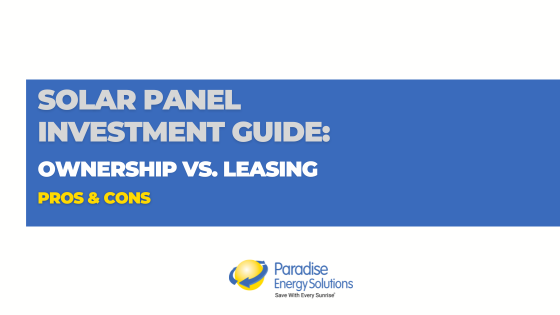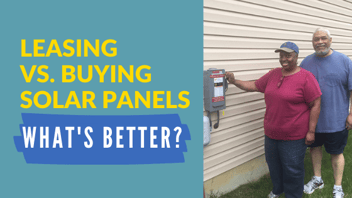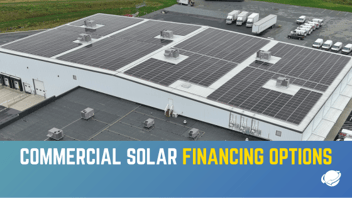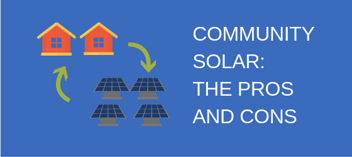Solar Financing Options: Ownership vs. Leasing Pro's and Con's

Your path to having solar energy has reached a fork in the road: Solar Ownership or Solar Leasing. Whether you are motivated by sustainability or cost savings, going solar gives homeowners the opportunity to make a difference.
Both options have advantages and disadvantages. Understanding the nuances of acquiring solar energy will ensure the best long-term solution with the greatest return on investment to meet your energy and financial goals.
Some companies advertise free solar panels to qualifying customers. Putting up no upfront costs for installation and management might sound appealing. However, knowing what solar leasing entails compared to the advantages of owning your panels will give you a better perspective on true savings.
Leasing Solar Panels
Solar leasing is similar to leasing a car. A company will pay for and install a solar system on your property. You purchase your electricity from them (the lease payment) for a 20-25-year commitment.
Solar Leasing Costs
It is important to understand, when leasing solar panels, the homeowner does not own the panels or the electricity they produce.
Your monthly payments on the lease can be influenced by your credit score, location, how much energy you use, and can also vary by leasing company. Once approved, there are no initial costs for purchasing or installing the system, just your agreed upon lease payments.
Initially the cost of your lease should be less than you pay for electricity from your utility company, reducing your monthly electricity bill. Although the payments are cheaper, having a lease is a contractual agreement to make payments for the length of the agreement (usually 15-25 years).
The big kicker is many lease agreements include an inflation escalator, which could potentially eliminate future savings by gradually raising prices faster than traditional electricity rates. Escalators are built into the leasing contract to increase the rate you pay for electricity each year. That means you could even end up paying more for your solar electricity than you would have had you not gone solar at all.
Are There Tax Incentives For Solar Lease?
With the worldwide push for sustainable energy options, national and state level incentives exist for homeowners who purchase solar. When leasing your solar system, the company who owns the panels and energy is collecting those incentives. This includes a 30% tax credit and solar renewable credits (SRECS).
On Going Maintenance
A great advantage of leasing a solar system is the leasing company is responsible for all system maintenance. With solar ownership, the owner is responsible for these maintenance costs.
When you agree to a leasing contract, you give the company continuous access to the area of your property where the panels are located for the duration of the lease to allow for cleaning, general upkeep, and repairs as needed.
Pros:
|
Cons:
|
Solar Ownership
Solar ownership is when the property owner pays for the complete upfront project cost and takes on full responsibility for the system.
There are several financing options available for those looking to purchase their solar system. These options include cash out-of-pocket or loans from local banks.
Solar Warranties of Owners
While owning your panels, your system will have a long period where maintenance, parts, and the professional installation are covered under warranty.
Many solar panel manufacturers guarantee their products for 25 to 30 years, and inverter manufacturers guarantee theirs for 10 to 25 years, protecting you against faulty equipment.
If you hire a qualified installer, they will likely have additional warranties available to cover any gaps. Some solar panel installers also guarantee their work on top of the manufacturer warranties, further protecting your investment. At Paradise Energy, our systems come with a ten-year workmanship warranty as part of the Triple Ten Guarantee.
When your warranties expire, maintaining and repairing the system becomes your responsibility.
Solar Tax Incentives
Aside from creating your own sustainable energy, one of the biggest advantages to solar ownership are the financial incentives including the 30% tax credit, accelerated depreciation (commercial and agricultural), and the reduction or elimination of your electric bill.
SRECs, or solar renewable energy credits, are another source of income for solar owners if their solar system is located in a state with an SREC market. Solar owners receive one credit for every 1,000 kilowatt-hours their system produces. This credit can then be sold on the SREC market at a variable price.
Another benefit of solar ownership is that the long-term electricity savings are often much greater than with a lease.
Solar ownership gives you free electricity for the entirety of the system’s life. With solar panel warranties lasting 25 to 30 years, that life can extend for decades. In the beginning, those savings can go towards paying off the cost of the solar system. But once it reaches payback, you’ll be left with many years of cost-free electricity – never worry about a rate increase again.
Pros:
|
Cons:
|
Selling Property With Solar Panels
For many homeowners, the effects of solar installation on their home’s overall value are the key factor in deciding whether to buy or lease.
Selling Property: Solar Ownership
Studies show owned solar panels increase the value of homes around $15,000. Additionally, the new owner could benefit from the 30% tax credits, government grants, and other incentives you enjoyed as an owner.
You will attract buyers who will appreciate avoiding the hassle of installing solar on their own and the benefits of free electricity for years to come.
Selling Property: Solar Leasing
During the lease term, the buyer must be willing to assume the lease agreement or the original owner faces early termination penalties outlined in the lease agreement. The buyer must also meet the solar leasing company’s credit score requirements, which could shrink your pool of buyers.
|
Solar Lease |
Solar Ownership |
|
|
Tax Savings & SRECs |
The solar leasing company receives all the tax savings and SREC income (as available). |
The solar owner receives all the tax savings and SREC income (as available). |
|
Maintenance Costs |
Solar leasing company responsible for maintenance costs and upkeep. |
Solar owner responsible for maintenance costs and upkeep. |
|
Electricity Prices |
You pay the solar leasing company each month to use the electricity generated by the solar system on your property. |
You have total access to the free electricity generated by your solar system. |
|
Selling Your Property |
Selling your property can be harder, as you’ll have to find a buyer with a credit score high enough to assume the lease. The buyer will also have to be satisfied with the terms of the lease, which could be difficult if there’s an aggressive price escalator. |
Your property value increases by installing a solar system. Your home is more desirable and worth more to prospective buyers, as it comes with the means to produce free electricity. |
Choosing Between Solar Lease vs Ownership: What are your next steps?
If you have the money to invest in your own solar system, or you can get access to a solar loan, ownership can be better in the long run. If you cannot purchase a solar system outright and still want to produce clean energy, leasing may be the more appropriate option.
If you choose to lease your solar panels, read the agreement closely and pay very close attention to the lease escalator.
If you opt for solar system ownership, be sure to partner with a trusted solar installer that uses quality parts that are backed up with substantial warranties.
Our team of local solar consultants are trained to help guide you along your path to energy independence. Your consultant will provide a free solar quote that clearly defines the price, payback, ROI, year-by-year cash flow, and all the environmental benefits.





